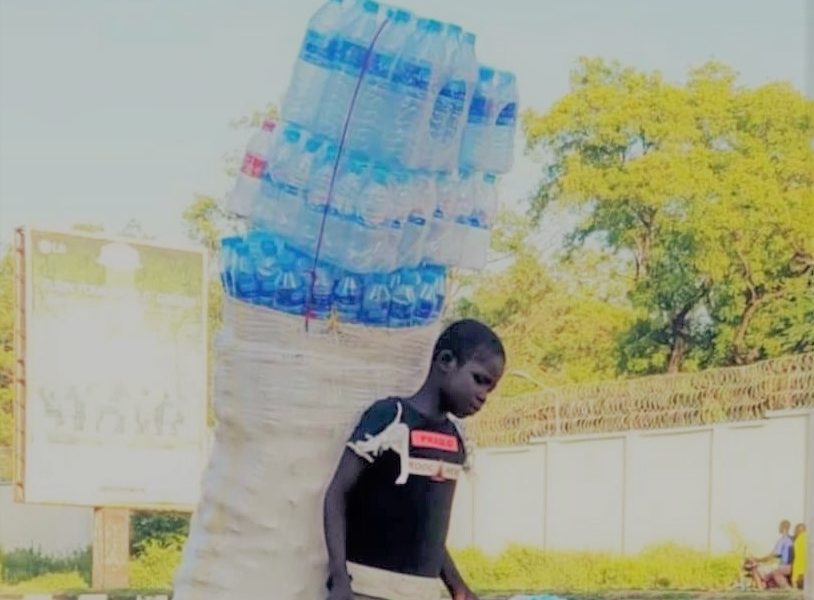By Bida Elly David
Juba City’s main streets are crowded with abandoned and vulnerable children who survive at the mercy of God. Some collect used plastic bottles and sell them to earn a living, while others rely on rubbish bin leftovers from hotel and restaurants.
On Thursday, the No. 1 Citizen Daily Newspaper spoke to some of these unprivileged kids.
Ezbon Mogga is a 12-year-old kid who survives on the street by collecting and selling used plastic water bottles.
Mogga said he always tries as much as possible to gather enough empty bottles and sell them to buy a bag of bread.
He recounted that his father was once a well-paid staff for an international organization where all services were fully rendered at home, but the world turned dark after his dad fell ill with a stroke.
He said that no one understood the history of his father’s medical complications until his demise.
“I am not a street kid. When I see people chasing me from their shops thinking I am a thief, I really feel sorry and think back to when Baba used to take us out with my younger brother Joel,” he moaned.
Mogga said that his ambition to make a change in his family and society could never be inevitable.
“My mother is not educated. I think Mother would have been our helper if she had gone to school and attained her studies, but our support was only from one side, which is why I am termed a single orphan today,” he said.
Meanwhile, Mogga’s younger brother, Joel, underscored that he has no will to join public schools due to the fact that teachers don’t teach due to their financial situation.
“I want somebody who can sponsor me in private schools where I can compete and receive in-depth lessons,” he said.
“If I join a public school, I will be sympathizing with my brothers and sisters from poor families and will lose my focus on learning.”
Joel did not reveal what her mother does to ensure they receive services as demanded, stating that he mostly spends his time in the market.
Joel, however, said he is proud of his little business since he could always go home with 5,000 SSP, but he remains frustrated by how people describe and term him in his dirty clothes.
Another struggling street kid, Luka Sabri, 13 years old, homeless barrow boy, said he met his friend Joel at a chapatti joint in Kubri Haboba, where they had conversations concerning their business.
Sabri said he jumped into the market, following undefined fights between his parents that left his father to leave home for his new wife.
He said that his father, who could always come home drunk, beat his mother until she resorted to drinking out of frustration.
Sabri said that life became worse when his mother resorted to serious drinking while they (the children) needed their care and attention.
“I couldn’t leave my two sisters starving.” My mother, out of frustration, has gotten used to alcohol. I better leave school and find food for my siblings. Education has no end. God will pave ways for us,” he wailed.
The 13-year-old kid on the street vowed to become a businessman in the future to help his family and promised not to forgive his father for making his mother miserable.
“My father was okay, but alcohol made him worse.” It is because of my father that I am called a street boy today. I will never give up since God has different plans for me,” he asserted.
Sabri promised to make his 45-year-old mother, Betty Kaku, a golden woman of dignity for society and his community in particular.
Meanwhile, Dorothy Drabuga, a gender and child rights activist, slams irresponsible parents for destroying the future of their children and driving them into a miserable world.
She said that most children in South Sudan leave their homes for the streets due to the fact that they are not provided with services.
Drabuga further noted that drug abuse and the environment have greatly contributed to the breakaway of most children from their homes.
She urged the government to establish rehabilitation Centers and orphanages where these children are assembled and kept for reform.
“Most of these kids come from the states and join those in Juba. I blame parents and the government for leaving these kids on the streets,” she said.
“Due to drugs, some of them ran crazy, which is wrong,” Drabuga added.
According to the Children’s Fund (UNICEF) across South Sudan, 70 percent of children are unable to attend school due to poverty, catastrophic flooding, and reoccurring conflict.
Meanwhile, the 2022 IPC report shows that about 1.34 million children under five years are expected to suffer from acute malnutrition based on the results of SMART nutrition surveys, the Food Security and Nutrition Monitoring System (FSNMS) survey, and program admission trends.
Attempts to contact the minister of gender and child social welfare, Aya Warille, for comment on the matter were unsuccessful, as she declined to comment, saying she was out of the office and couldn’t talk.




